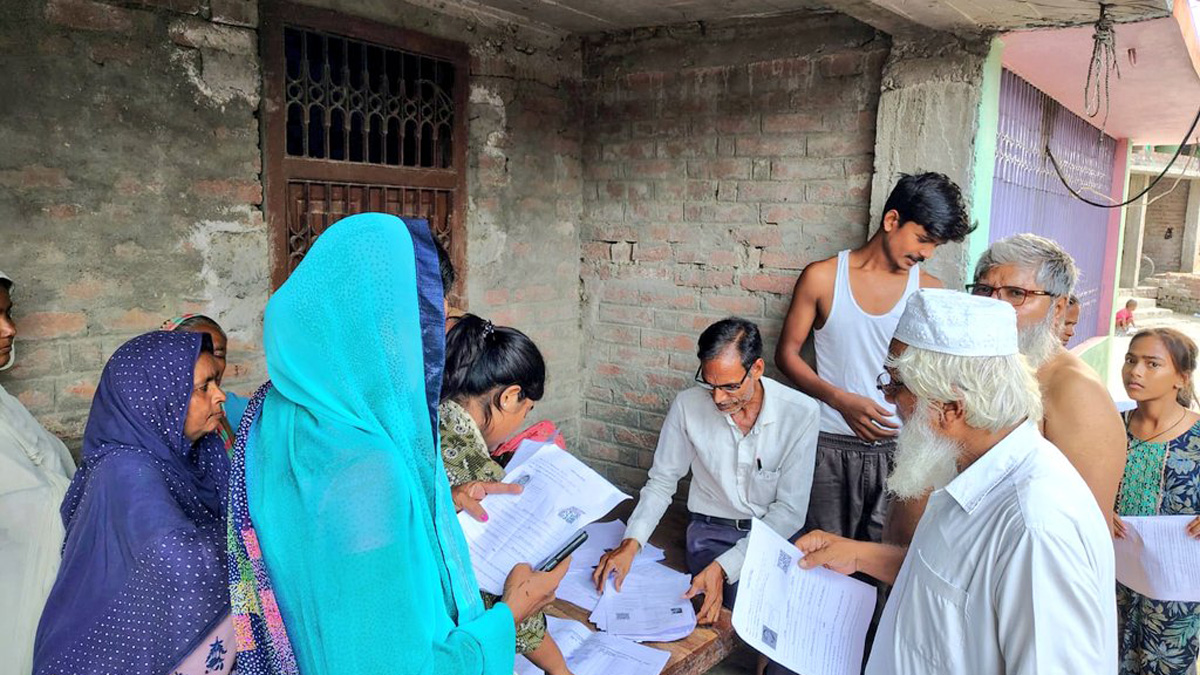Bihar SIR: SC steps in, directs Legal Services Authority to help deleted voters
 (File) A BLO collecting documents as part of Bihar SIR in Vaishali district, Bihar
(File) A BLO collecting documents as part of Bihar SIR in Vaishali district, Bihar
The Supreme Court on Thursday sought to ensure that no genuine voter in Bihar is left disenfranchised amid the chaos over the Election Commission’s Special Intensive Revision (SIR) of electoral rolls, even as the courtroom witnessed sharp exchanges between the poll body and petitioners over allegations of false affidavits and large-scale deletions.
A bench of Justices Surya Kant and Joymalya Bagchi, hearing multiple petitions challenging the SIR, passed an interim direction requesting the Bihar State Legal Services Authority (SLSA) to step in and assist those whose names were deleted from the final electoral rolls in filing statutory appeals.
The bench asked the SLSA executive chairman to direct all District Legal Services Authorities (DLSAs) to immediately mobilise paralegal volunteers (PLVs) and free legal aid counsels to help excluded citizens draft and submit their appeals before electoral registration officers.
“The secretaries of DLSAs shall renotify mobile numbers and full details of PLVs in each village. They will contact booth-level officers (BLOs) and reach out to excluded persons to inform them of their right to appeal,” the Court ordered, adding that the SLSA should submit a status report within one week. The directions, it clarified, will also apply to those whose names were missing from the draft rolls itself.
EC vs petitioners: The affidavit dispute
The hearing began with the Election Commission of India alleging that one of the affidavits produced by the petitioners to show wrongful deletions was false. Senior advocate Rakesh Dwivedi, appearing for the EC, told the bench that the individual in question was never in the draft roll as he had failed to submit the required enumeration form.
Calling the affidavit false and perjurious, Dwivedi accused civil society groups like the Association for Democratic Reforms (ADR) of “spinning narratives without verification.”
“The affidavit they filed is false. The person was not in the draft list. He is giving a wrong story that he was deleted. ADR must satisfy itself before throwing such papers before this court,” Dwivedi argued, demanding that an affidavit be filed on how the document reached the court.
Justice Kant remarked, “Now there is a doubt whether there is a person by this name,” and later added that while the Court wanted to help those genuinely excluded, “the person should have disclosed correct information… we also do not appreciate this.”
Advocate Prashant Bhushan, appearing for ADR and other petitioners, defended himself saying the affidavit had been given by a responsible person and urged that the Legal Services Authority be asked to verify the facts. “Your Lordships may ask LSA to enquire into the affidavit and file a report. All facts will come out,” he said.
Right to appeal: Supreme Court’s priority
Refusing to get drawn into the factual wrangle, Justice Kant stressed that the Court’s focus was on ensuring no eligible voter is left without recourse. “If timelines are not there, we can fix them. If appeals are dismissed with cryptic one-line orders, that also will be taken care of. We reassure you on this,” he told Bhushan.
Dwivedi, for his part, maintained that “no elector has come forward to say that the order of deletion has not been served.”
However, Bhushan countered that lakhs of voters never received any deletion order despite the ECI claiming to have served them. He accused the Commission of violating its own standard operating procedures by requiring voters to file enumeration forms and not treating the earlier list as the base roll.
“The onus was on BLOs to go house-to-house and ascertain who lives there. Instead, citizens were asked to produce documents again. That is against their own rules,” Bhushan submitted, lamenting that the petitioners had been “burning the midnight oil” to identify the missing names without ECI’s cooperation.
'Largest contraction of electoral roll'
At the heart of the petitions is the claim that over 47 lakh voters were dropped from Bihar’s rolls during the SIR, making it the largest contraction of an electoral roll in India’s history. Petitioners, including Yogendra Yadav, have argued that the process led to systemic, structural and targeted exclusion, particularly affecting women and marginalized groups.
Appearing in person, Yadav told the bench that the SIR had “weaponized a benign administrative exercise.” Citing government data, he said that instead of expanding towards Bihar’s adult population of 8.22 crore, the rolls shrank to below 7 crore, creating a deficit of 81 lakh voters.
“The problem of excess voters was solved. But instead of stabilising, we gave a shock treatment, now the roll has low blood pressure,” Yadav remarked.
He also alleged irregularities such as duplicate names, gibberish entries, and implausibly large households on paper. “There are 2,200 houses that have 4.5 lakh voters in them. In some places, a blank is going to vote! Names are in Kannada and Tamil in the Bihar rolls. Is this not gibberish?” he asked.
Yadav said the gender ratio in the rolls, which had been improving for a decade, had worsened again due to the SIR. “Ten years of gains have been wiped out. Wherever SIR goes, women’s disenfranchisement follows,” he asserted.
Dwivedi dismissed these claims, saying many of the so-called anomalies were explainable by ground realities and joint family systems. “Criticism helps us. Maybe this experience will make us wiser for future SIRs,” he conceded.
A non-adversarial effort
Before concluding, Justice Kant reiterated that the Court’s directions were meant to assist, not indict. “We thought we could help those who genuinely want to be included. Let us maintain some fairness,” he said.
The bench then allowed Yadav to continue his submissions, while noting that the EC will be given time to file a comprehensive response and slated the hearing for October 16.
India